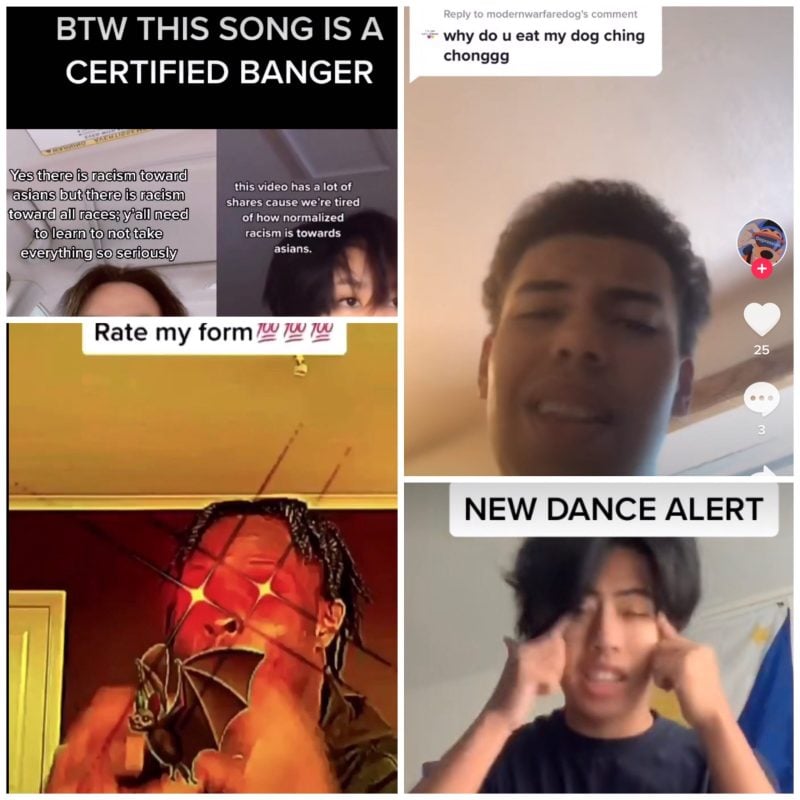“Your dog is so cute,” a classmate texted me after my dog walked into the background of a Zoom call. “He looks so tasty!”
“Excuse me?” I asked.
“I thought you’d be happy, aren’t you Chinese?” he replied.
It was an obvious attempt at a joke, but unfortunately, my sense of humor doesn’t include racism and microaggressions.
In our society today, racism against Asians has been so normalized that it’s often overlooked despite its blatancy. TikTokers dance to songs that openly mock Asians, and racist stereotypes about the ways we speak and eat are thrown in our faces under the pretense of being “just jokes.”
With the increased prevalence of TikTok, many old songs are reemerging in popularity amongst app users. One sound is a clip of a rap, “The Race,” by social media star Victoria Rose Waldrip, better known as Woah Vicky. The twenty-year-old released the song in 2017 in an attempt to diss YouTuber RiceGum, born Bryan Le. In the clip, Vicky repeats, “Ching chong ching chong ching chong, bitch // (meow meow meow meow meow) // I don’t eat no cat, bitch.”
The phrase “ching chong” has been used for years to mock the way that Chinese people speak, although the term is used to ridicule other Asians as well.
In an interview with Fox Sports Net in 2002, basketball star Shaquille O’Neal said, “Tell Yao Ming, ‘Ching-chong-yang-wah-ah-soh.’” Later O’Neal apologized, saying that it was a joke and apologizing to anyone he offended.
Despite the unapologetic intolerance in Vicky’s diss track, nearly 5,000 videos have been made using the sound. Although many are using the sound to raise awareness about the normalized racism against Asians and Asian Americans, there are countless other insensitive videos, such as a man dancing to the song, pulling his eyes to the side while making eating motions when Vicky makes meowing sounds with the caption “NEW DANCE ALERT.”
Others are using the sound to make videos about their disappointing test scores, or to call the song a “certified banger” or a “K-pop song,” and to tell Asians not to take everything so seriously.
The normalization of racism against Asians and Asian Americans has created a paradigm in which every Asian who is offended by the racist jokes being made at their expense is a “snowflake” or “soft.” People, including O’Neal, claim that it’s just a joke — just “dark humor” — and that excuse is almost always quickly accepted, xenophobia forgotten.
When Woah Vicky first released “The Ride,” she received backlash from people who said her song was offensive and disrespectful to Asians. She eventually issued an apology, clarifying that the remarks made in her song were only directed towards RiceGum. Regardless of who Vicky was targeting, the insults she used in her song were a compilation of outdated stereotypes and derogatory phrases used to insult an entire race. Despite her blatant ignorance and disregard of her audience’s attitudes, Vicky still has nearly three million followers on Instagram and frequently releases new songs, which a committed fan base of tens of thousands gladly streams.
Because of COVID-19, Asian Americans have been the target of racial discrimination now more than ever. It started off as relatively general jokes about the virus itself and its symptoms, but as the pandemic became more widespread and its origins more well known, Asians and their diets became the butt of many jokes.
Before my high school closed down in March, my classmates joked that they had coronavirus and coughed on their friends in the halls. These jokes soon moved to TikTok, where students expressed their annoyance at “the guy who ate the bat” and hoped that “the Chinese learned their lesson to stop eating dogs.”
Then, our president began calling it the “Chinese virus,” a term that quickly became adopted by other government officials. I’ve seen and experienced sinophobia, just never openly from our nation’s supposed “role models.”
As online platforms expand, it’s much easier for people to develop a flippant attitude towards racism and discrimination. Being able to hide behind a screen makes it easier for offensive gestures and actions to take place because there is a preconception that there will be no repercussions.
The continuation of these trends can only lead to more insensitivity and apathy. It will drive a barrier between people and will enforce the idea that racism is okay, as long as there is a shadow of humor behind it.
This behavior cannot continue. While society as a whole is taking steps forward in various aspects of social change and progress, there are countless areas where we can change, and need to change.
The model minority stereotype — that Asians experience higher levels of economic success through their obedience and hard work — is a myth that makes it all too easy for the needs of Asian Americans to be marginalized and ignored. It often isolates Asian Americans from other minorities who are facing similar forms of discrimination and microaggressions.
As I’ve grown older, my responses to people’s offensive microaggressions have matured as well. My eye shape is not a trend; I don’t eat dogs and math is not my favorite subject. Dancing to a song in which “ching chong” makes up the majority of the lyrics is not funny, and asking if we know who ate the bat is not lighthearted banter. This virus is a worldwide, human tragedy — not just a Chinese one. Jokes formed from offensive and outdated stereotypes cannot just be blown off as “dark humor.” It’s racism, and it needs to change.
Contact Amanda Zhu at amandaz9888 ‘at’ gmail.com.
